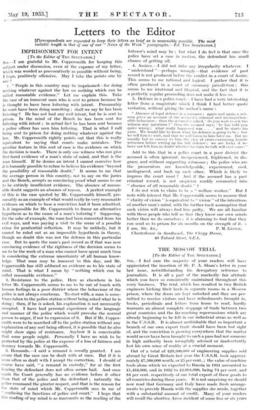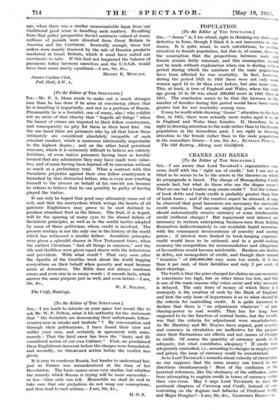THE MOSCOW TRIAL
[To the Editor of THE SPECTATOR.] SIR,—I feel sure the majority of your readers will have appreciated the insertion of Mr. P. A. Sloan's letter in your last issue, notwithstanding his derogatory reference to journalists. It is all a part of the markedly fair attitude which you have so consistently maintained throughout this sorry business. The trial, which has resulted in two British engineers kicking their heels in separate rooms in a Moscow prison, where the doors are kept unlocked and they are per- mitted to receive visitors and have refreshments brought in, books, periodicals and letters from home to read, hardly warrants an almost complete stoppage of trade between two great countries and the far-reaching repercussions which are already beginning to be felt in our industrial areas as well as in the U.S.S.R. It is almost unthinkable that so important a branch of our own export trade should have been lost sight of, and the conviction is growing everywhere that the matter would never have been brought to such a pass had not someone in high authority been wrongfully advised or inadvertently lost his own sense of reality at a crucial moment.
Out of a total of 129,500,000 of engineering supplies sold abroad by Great Britain last year the U.S.S.R. took approxi- mately £7,500,000 worth, or 25 per cent. ; the value of machine tools alone which we exported to Russia in 1931 amounted to £1,434,000, and in 1932 to 12,094,000, being 74 per cent. and 84 per cent. respectively of our total export of these goods to all countries during those years. It is not surprising we should now read that Germany and Italy have made fresh arrange- ments to provide Russia with the supplies she needs, together with a substantial amount of credit. Many of your readers will recall the abortive Areos incident of some five or six years
ago, when there was a similar unaccountable lapse from our traditional good sense in handling such matters. Resulting' from dist policy prospective Soviet contracts valued at many millions of potuids were diverted frOin Great Britain to America and the Continent. Ironically enough, these lost orders were mainly financed by the sale of Russian products marketed in Great Britain, which it must have suited our merchants to take. If this had not happened the balance of payments today between ourselves and the U.S.S.R. would have been more nearly equalized.—I am, Sir, &c.,
HENRY E. MErcALs.
Junior Carlton Club, Pall Mall, S.W . 1.















































 Previous page
Previous page